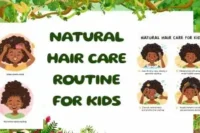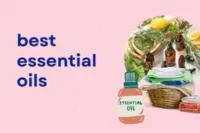Hibiscus Oil for Hair Growth: Proven Benefits, Smart Uses, and Expert Tips
Published: 16 Jun 2025
Can a flower transform your hair from dull to dazzling? For centuries, hibiscus oil has been a cherished secret in Ayurvedic hair oil traditions, praised for its ability to strengthen hair and support natural plant-based hair growth. Extracted from the vibrant Hibiscus rosa-sinensis, this floral oil is now winning hearts in the U.S. as more people turn to natural treatment for dandruff and shine-enhancing care. Unlike chemical-heavy products, hibiscus oil provides a clean and effective solution. Whether you’re battling hair loss or simply seeking a glow-up, this floral remedy might be your best-kept secret. Discover how this ancient treasure fits into your modern routines, and how your hair deserves it.
Introduction to Hibiscus Oil and Its Hair Care Legacy
For centuries, hibiscus has been a trusted ingredient in Ayurvedic hair oil traditions for promoting hair growth. In ancient India and other parts of Asia, women used crushed Chinese hibiscus flowers and leaves to create healing hair pastes and oils. These rituals were passed down through generations, often seen as sacred self-care routines to strengthen hair naturally and stop premature greying. Just like the ARGON OIL BENEFITS known today for deep nourishment and shine, hibiscus also plays a vital role in holistic hair care.
To create hibiscus oil, petals and leaves from Hibiscus rosa-sinensis are gently sun-dried. Once dried, they’re slow-infused into carrier oils for herbal hair care like coconut oil or sesame. Many people also apply coconut oil at night with hibiscus for deeper absorption. This process, often done at home or in small herbal batches, preserves the flower’s rich botanical extracts for hair, especially its amino acids, flavonoids, and vitamins.
Today, the U.S. hair care scene is catching on. Beauty influencers and herbalists are promoting herbal remedies for hair as natural, effective, and gentle. The surge in plant-based hair growth trends has made hibiscus oil a rising star. From clean beauty shelves to DIY herbal hair treatments, more Americans now trust this vibrant flower for lustrous hair and true nourishment without chemicals.
Key Benefits of Hibiscus Oil for Hair Health
Hibiscus oil is becoming a top favorite in the U.S. for its plant-powered hair care benefits.
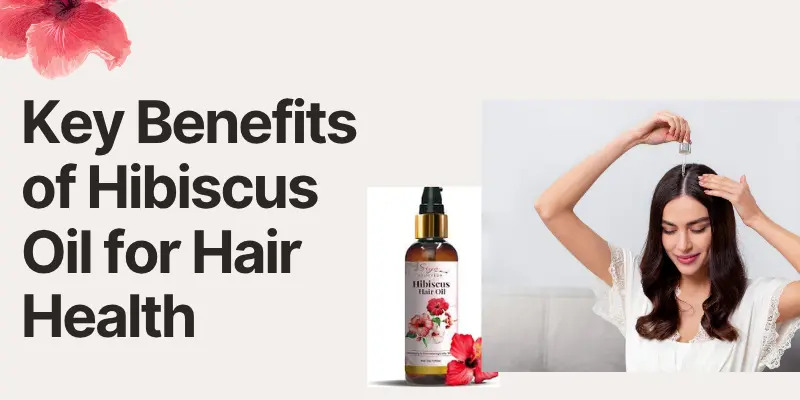
Used in Ayurvedic hair oil traditions for centuries, it’s now a popular choice among people looking for natural scalp care, hair loss prevention, and a reliable path to lustrous hair. Let’s explore why.
Prevents Hair Fall and Baldness
Hibiscus oil strengthens the roots and reduces excessive shedding. With regular use and gentle herbal hair oil massage, it nourishes follicles and minimizes breakage, making it an effective home remedy for hair fall and early-stage baldness. The oil supports hair follicle stimulation, encouraging thicker and fuller growth.
Stimulates New Hair Growth
This flower-powered oil acts as a potent plant-based hair growth booster. Studies and anecdotal evidence suggest that Hibiscus rosa-sinensis extracts can regenerate dormant follicles. Many users report seeing baby hairs along thinning areas after consistent use, making it a trusted choice for alternative hair care.
Deeply Conditions and Softens Hair
Hibiscus oil is a fantastic natural hair conditioner. It’s full of amino acids that soften and hydrate the hair shaft. When mixed with coconut milk for moisturizing or used as a yogurt protein treatment, it improves texture, shine, and manageability, especially for dry, frizzy hair types.
Fights Dandruff and Soothes Itchy Scalp
Thanks to its anti-fungal and cooling properties, hibiscus oil is a go-to natural treatment for dandruff. It relieves scalp irritation and reduces flakes. Blending it with fenugreek for dandruff, buttermilk for scalp care, or aloe creates an effective anti-dandruff herbal mask that soothes inflammation.
Enhances Natural Shine and Luster
If your hair looks dull or lifeless, hibiscus oil can help restore its vibrance. Its nourishing formula smooths the cuticle and enhances light reflection, giving you naturally lustrous hair. Combine it with botanical extracts for hair, like argan or apply rosemary oil, for an extra shine boost.
Delays Premature Greying
The antioxidants and vitamins in hibiscus oil help slow down pigment loss in hair follicles. It serves as a premature greying solution by fighting oxidative stress. Many people turn to it as a long-term remedy alongside other DIY herbal hair treatments and herbal remedies for hair aging.
Hibiscus oil delivers results with consistent care. Whether you’re looking to strengthen hair naturally, grow it longer, or manage scalp concerns, this vibrant red flower might be the answer your hair’s been waiting for.
Is Hibiscus Oil Effective for Hair Regrowth?
Can a flower bring thinning hair back to life? The answer may lie in both ancient tradition and modern research. Across cultures, hibiscus for hair growth has stood the test of time.

Today, people in the U.S. are rediscovering this plant-based hair growth secret as a safe, effective alternative to chemical solutions.
Scientific Insights and Ayurvedic Wisdom
For centuries, Ayurvedic hair oil blends have used Hibiscus rosa-sinensis to combat baldness and boost hair volume. Ancient texts describe this flower as a natural way to strengthen hair and stimulate dormant follicles. This isn’t just folklore; modern studies support these age-old claims.
Scientific research, including published animal trials, shows that both the leaves and flowers of hibiscus can encourage hair follicle stimulation. The flower is loaded with vitamin C, amino acids, and flavonoids. These nutrients help nourish the scalp, protect against oxidative stress, and promote new strand formation.
The petals are typically processed into herbal hair oil massage formulations using carrier oils for herbal hair care, like coconut or almond. These infusions not only moisturize but also act as a natural tonic for weak, lifeless roots.
Doctor and Expert Recommendations
Though FDA approval for herbal remedies like hibiscus is still limited, many holistic practitioners and trichologists recommend it based on clinical observation and anecdotal evidence. They often advise using scalp massage for hair growth with hibiscus oil two to three times a week. This helps increase blood flow, feeding the roots and encouraging regrowth.
Experts also suggest pairing hibiscus oil uses with complementary treatments like a hibiscus hair mask, natural hair conditioner, or aloe vera gel for hair. For even better results, some recommend adding fenugreek for dandruff or coconut milk for extra nourishment.
People across the U.S. are turning to alternative hair care solutions like DIY herbal hair treatments featuring hibiscus. Results vary, but consistent users often report visible hair loss prevention and a return of volume and thickness improvement within 2–3 months.
When added to your weekly hair nourishment routine, hibiscus oil offers more than hope; it offers real, natural results backed by tradition and science.
How Hibiscus Oil Strengthens Hair from Root to Tip
If your hair feels weak, thin, or brittle, hibiscus oil may be the rescue it needs. This flower-based oil acts like a full-body workout for your strands, feeding them from the inside out.
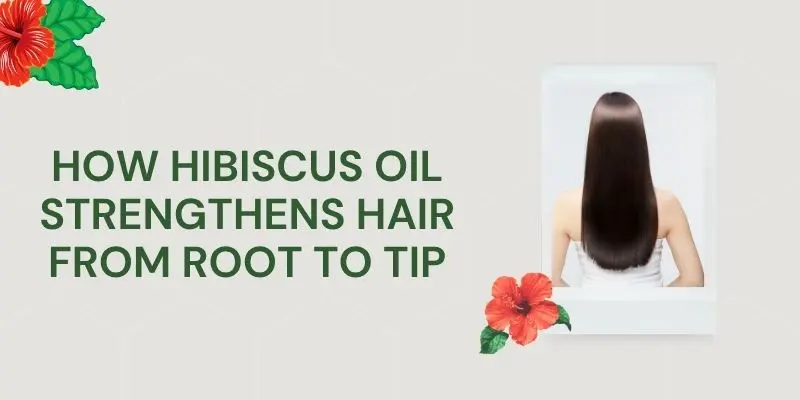
It’s one of the best hair thickening herbs to naturally rebuild strength and shine.
Nourishment at the Follicle Level
Hibiscus oil is packed with vitamin C, amino acids, and powerful antioxidants. These nutrients go deep into the scalp to fuel the hair roots. This helps in hair follicle stimulation, making it a true natural treatment for dandruff and weak strands.
Hibiscus rosa-sinensis improves blood circulation to the scalp. When used in a herbal hair oil massage, it delivers essential nutrients directly to your follicles. Think of it like a yogurt protein treatment or a botanical extract for hair, but in oil form. You’re not just coating your hair—you’re healing it at the root.
This is why hair care with flowers, especially hibiscus, has remained a key part of Ayurvedic hair oil traditions for centuries. Now, it’s gaining popularity in the U.S. as a trusted alternative hair care option.
Improves Thickness and Density Over Time
With regular use, hibiscus oil can boost volume and improve thickness. It makes the strands stronger and less prone to breakage. People often notice fuller, softer hair after just a few weeks of a dedicated hair nourishment routine.
This oil is also a go-to for those fighting hair thinning. Its nutrients encourage plant-based hair growth, similar to how a coconut oil and hibiscus blend can deeply moisturize and fortify each strand.
It acts like a natural hair conditioner that builds strength, not just masks damage. Over time, your hair begins to feel like itself again: thick, smooth, and full of life.
Ready for stronger strands from root to tip? Hibiscus for hair growth might just be your perfect match.
Using Hibiscus Oil to Combat Dandruff and Scalp Issues
Dry flakes, constant itching, and scalp irritation: dandruff can ruin your hair confidence. But hibiscus oil may hold the natural solution your scalp craves.
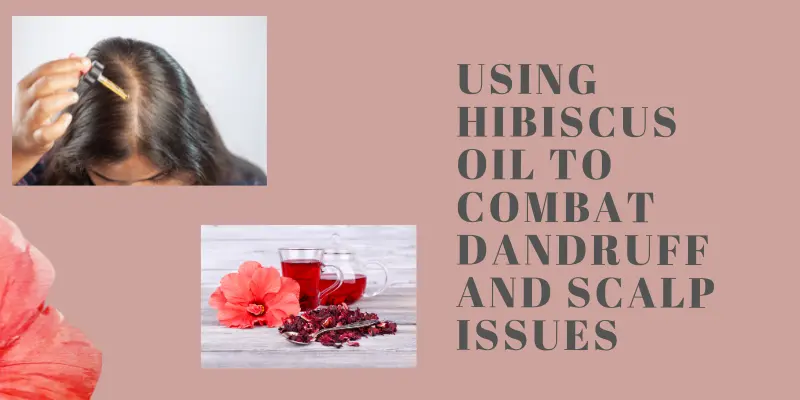
Thanks to its anti-fungal and anti-inflammatory nature, it’s a powerful ally in fighting scalp discomfort and flakiness.
Anti-Fungal and Anti-Inflammatory Properties
Hibiscus oil works like a shield against dandruff-causing microbes. Its antifungal properties help cleanse the scalp and reduce inflammation, making it one of the best natural treatments for dandruff.
Many herbalists recommend hibiscus as part of DIY herbal hair treatments or an anti-dandruff herbal mask. Blending it with fenugreek for dandruff or coconut oil and hibiscus can boost its effectiveness even more. The flower’s natural acids balance the scalp’s pH while unclogging follicles.
In traditional Ayurvedic hair oil practices, hibiscus is praised for its gentle yet powerful scalp-healing benefits. It’s especially helpful during seasonal changes when flaking worsens.
Scalp Soothing and Cleansing Action
Hibiscus oil doesn’t just treat dandruff; it soothes the itch and refreshes the skin. This is key for anyone seeking natural scalp care. It cools and calms irritation, promoting comfort and balance.
When used during a scalp massage for hair growth, it not only hydrates but also stimulates blood flow, leading to a cleaner, healthier scalp. For best results, mix with aloe vera gel for hair or buttermilk for scalp care to boost the cooling and cleansing effect.
People have shared anecdotal evidence of reduced flaking and itchiness after a few weeks of using hibiscus oil. It’s a trusted pick for those wanting an herbal remedy for hair without harsh chemicals.
Say goodbye to dandruff and hello to a calm, healthy scalp. Hair conditioning with hibiscus truly makes a difference.
DIY Hibiscus Oil: How to Make It at Home
To make hibiscus oil at home, start by drying a handful of hibiscus flowers and leaves. Once dry, crush them gently. Heat about one cup of coconut or olive oil and add the crushed hibiscus. Let it simmer on low heat for 5–7 minutes.
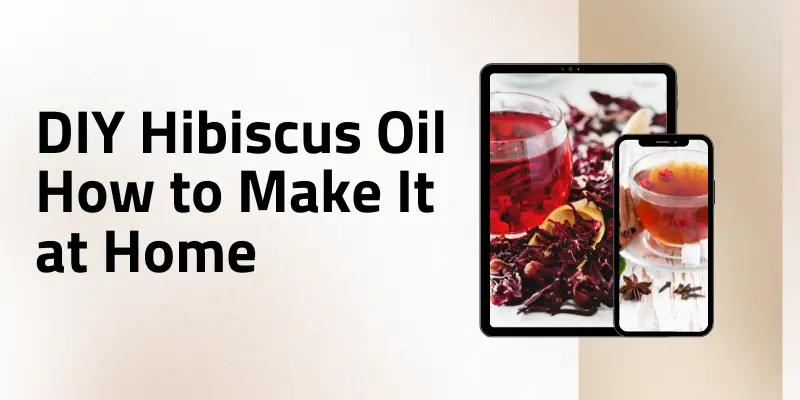
When the oil turns slightly red, turn off the heat and let it cool. Strain and store in a clean bottle. Making hibiscus oil at home is easy, affordable, and gives you full control over what goes into your hair care. This is a perfect DIY herbal hair treatment that brings nature straight to your scalp.
Ingredients and Step-by-Step Instructions
To make your herbal hair oil, you’ll need:
- Fresh or dried Hibiscus rosa-sinensis flowers and leaves
- A carrier oil for herbal hair care (like coconut, almond, or jojoba oil)
- Optional: fenugreek for dandruff, aloe vera gel for hair, or coconut milk for moisturizing
Step 1: Clean the flowers and leaves. Let them dry completely in the shade to avoid moisture buildup.
Step 2: Crush them lightly to release their nutrients.
Step 3: In a clean pan, heat one cup of coconut oil and hibiscus mix on a low flame.
Step 4: Add the crushed hibiscus. Let it simmer for 10–15 minutes until the oil turns deep red.
Step 5: Remove from heat. Strain the oil once it cools.
This blend acts as a natural hair conditioner and is one of the most effective botanical extracts for hair care.
Tips for Freshness and Storage
To keep your homemade oil fresh:
- Store it in a dark glass bottle to protect the nutrients.
- Keep it in a cool, dry place away from direct sunlight.
- Always use a clean spoon or dropper when applying.
For added freshness, consider mixing in anti-dandruff herbal mask ingredients like buttermilk for scalp care or a spoonful of yogurt protein treatment before application.
Use this oil twice a week for maximum benefits. It’s not just a natural treatment for dandruff, but also helps in hair follicle stimulation and hair loss prevention. With consistent use, you’ll notice volume and thickness improvement and enjoy truly lustrous hair.
This simple, powerful recipe proves that hair care with flowers isn’t just a trend; it’s a timeless ritual backed by alternative hair care wisdom.
Different Ways to Use Hibiscus Oil in Your Routine
You can massage hibiscus oil directly into your scalp to boost blood flow and help with hair growth. Leave it overnight or wash it after an hour. Mix it with your regular shampoo or conditioner for added shine.
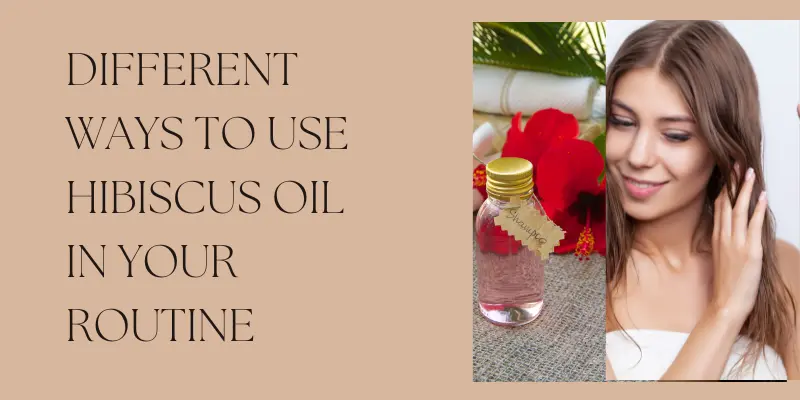
You can also add a few drops to your hair mask for deep nourishment. Use it 2–3 times a week for best results. You can enjoy the power of hibiscus oil in many ways. Whether you’re fighting dryness or trying to strengthen hair naturally, this oil adapts to every routine.
Scalp Massage
A weekly herbal hair oil massage is a great way to boost circulation. Warm a few tablespoons of hibiscus oil and gently apply it to your scalp using your fingertips.
This technique supports hair follicle stimulation and promotes hair growth. Leave it on for at least 30 minutes before washing.
Massaging with hibiscus oil can also ease tension and reduce scalp irritation. It’s a key part of a natural scalp care routine.
Pre-Wash Treatment
Use hibiscus oil as a pre-wash treatment to protect your strands. Apply it to your scalp and hair 30–60 minutes before shampooing.
It shields the hair shaft, softens dryness, and helps prevent moisture loss. This is especially effective when paired with a hibiscus shampoo or a mild, sulfate-free formula.
This step is excellent for those struggling with hair fall or looking for natural hair loss prevention.
Hair Mask Infusion
Add hibiscus oil to a hibiscus hair mask or a yogurt hair mask for deeper conditioning. Mix equal parts of the oil with:
- Aloe vera gel for moisture
- Coconut milk for hydration
- Buttermilk for scalp care
This blend acts as a natural hair conditioner and offers intense nourishment.
Use this mask once a week for smooth, lustrous hair.
Mixed with Other Herbs Like Amla, Aloe Vera, or Onion
Combine hibiscus oil with plant-based hair growth boosters like:
- Amla oil for strength
- Onion juice for regrowth
- Fenugreek for dandruff control
- Aloe vera for hair softness
- These hair thickening herbs create powerful blends and serve as excellent alternatives to synthetic hair care products.
- Experiment with hibiscus and fenugreek to craft your own Ayurvedic hair oil recipe. Mix in additional botanical extracts to enhance results.
Pro Tip: Tailor your application based on your hair type. Thick hair benefits from heavier application and longer soaking, while fine hair responds well to light oiling and quick rinses.
Hibiscus Hair Care Recipes Worth Trying
Hibiscus is more than just a flower; it’s a complete hair care solution. With the right combinations, you can create powerful DIY herbal hair treatments at home. These recipes help tackle dryness, hair fall, dullness, and more.
Hibiscus & Amla Mask
This classic Ayurvedic hair mask helps reduce breakage and boosts volume.
Ingredients:
- 3–4 fresh hibiscus flowers (or 2 tbsp dried powder)
- 2 tbsp amla powder or juice
- 2 tbsp yogurt
- Water (as needed)
Instructions:
Grind the hibiscus flowers and mix them with amla and yogurt to form a smooth paste. Apply to the scalp and hair. Leave on for 30 minutes, then rinse.
This mask strengthens strands, combats dandruff, and supports hair thickening.
Hibiscus & Aloe Vera Mask
Perfect for dry, damaged, or chemically treated hair, this mask works as a deep conditioner.
Ingredients:
- 2 tbsp aloe vera gel
- 2 tbsp hibiscus oil
- 1 tbsp coconut milk
Instructions:
Blend all ingredients and apply to damp hair. Let sit for 25–30 minutes, then rinse.
This recipe revives shine, restores bounce, and promotes hair follicle stimulation.
Hibiscus & Onion Oil Blend
Ideal for those facing hair thinning or seeking a premature greying solution.
Ingredients:
- 2 tbsp hibiscus oil
- 2 tbsp onion juice
- 1 tsp fenugreek (optional)
Instructions:
Mix well and warm slightly. Apply to your scalp, massage gently, and leave on overnight or for 1 hour before washing.
This blend combines herbal remedies and hair loss prevention benefits.
Natural Hibiscus Conditioners
Make quick DIY conditioners using hibiscus and carrier oils.
Ingredients:
- 2 tbsp hibiscus paste
- 1 tbsp honey
- 1 tbsp carrier oil (like jojoba or almond)
Instructions:
Apply after shampooing. Leave on for 5–10 minutes, then rinse.
This lightweight conditioner is perfect after a herbal hair oil massage or mask session.
Quick Tip: Customize your blend with ingredients like yogurt (protein treatment), buttermilk (scalp care), or fenugreek for targeted results.
Creating Your Hibiscus Hair Care Regimen
Start by using hibiscus oil 2 to 3 times a week. You can apply it before washing your hair or leave it overnight for deeper care. Add hibiscus powder to your hair masks or mix it with aloe vera for a soothing scalp treatment.
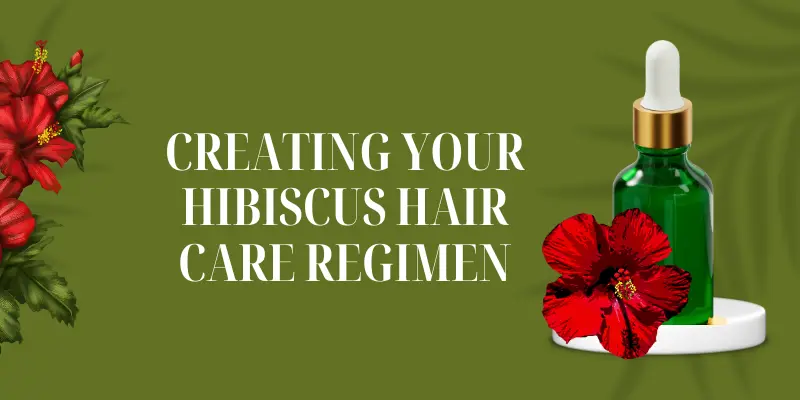
Use hibiscus shampoo or conditioner if available. Be gentle when massaging your scalp. To see real results from hibiscus oil, you need a steady routine. A proper plan helps you unlock every benefit this plant-based hair booster offers.
Weekly Routine Suggestions
For most people, 2–3 sessions per week improve both scalp and hair health.
Suggested Routine:
- Monday – Do a warm hibiscus oil scalp massage. Leave it overnight.
- Wednesday – Apply a deep repair mask like hibiscus & yogurt or hibiscus & fenugreek.
- Saturday – Reapply hibiscus oil infused with hibiscus rosa-sinensis and massage well.
This routine supports hair follicle stimulation and long-term hair loss prevention.
Combining Hibiscus Oil with Shampoos and Masks
Pair hibiscus oil with sulfate-free, botanical shampoos and nourishing masks.
Best Pairings:
- Hibiscus shampoo after an oil massage
- Aloe vera or coconut milk-based masks
- Buttermilk anti-dandruff masks for scalp balance
These natural products enhance absorption and align well with Ayurvedic hair care.
Ideal Frequency for Visible Results
To achieve noticeable change:
- Use hibiscus oil 2–3 times weekly
- Apply a natural conditioner or hair mask once a week
- Maintain this routine for 6–8 weeks to see results like volume, shine, and reduced breakage
For dry hair, increase usage slightly. For oily scalps, reduce frequency.
Consistency is key– stick with your routine to enjoy thicker, shinier, and stronger hair.
Customize Your Hibiscus Hair Journey
Every hair type is unique, so your routine should be too. Explore combinations like:
- Hibiscus and yogurt protein treatments
- Coconut oil and hibiscus infusions
- Carrier oils blended with aloe vera, fenugreek, or buttermilk
Build your personalized regimen with DIY herbal hair treatments that support your hair goals.
With a little trial and consistency, your perfect hibiscus hair care plan will bloom just like your strands.
Conclusion:
Hibiscus oil stands out as a true gem in natural hair care. From strengthening roots and reducing dandruff to enhancing shine and promoting growth, this herbal remedy brings powerful benefits in every drop.
With a rich history in Ayurvedic hair oil traditions and growing popularity in modern holistic beauty routines, hibiscus is gaining love worldwide, especially among Americans exploring plant-based hair growth options.
Don’t wait for a miracle in a bottle. Nature already gave you one.
Frequently Asked Questions About Hibiscus Oil for Hair Growth
Yes! Hibiscus oil supports hair growth by nourishing hair follicles and improving blood circulation in the scalp. Its rich vitamins, antioxidants, and amino acids strengthen the roots and promote healthier strands. Regular scalp massages with hibiscus oil stimulate growth and reduce hair fall over time. It also helps maintain the hair’s natural thickness and shine. Combining it with other hair-friendly oils can further boost growth.
Hibiscus oil is generally safe, but some people may experience mild irritation or an allergic reaction. Always perform a patch test on a small area of your skin before applying it all over your scalp. Look out for redness, itching, or swelling, and stop using it immediately if these occur. People with very sensitive skin should mix hibiscus oil with a milder carrier oil. Most users experience no side effects and find it gentle and nourishing.
Several oils are highly effective for hair growth, including castor oil, coconut oil, hibiscus oil, and rosemary oil. They nourish the scalp, strengthen strands, and help reduce breakage and hair fall naturally. Regular application improves hair thickness, shine, and overall health. Combining multiple oils in a hair blend can provide a synergistic effect, enhancing both growth and scalp nourishment. Consistent care is key to seeing results.
For the best results, apply hibiscus oil 2–3 times a week. Massaging it into the scalp improves blood circulation, strengthens roots, and promotes healthier hair growth. Over time, regular use can improve hair texture, boost volume, and reduce breakage. Consistency is more important than quantity—small amounts used regularly are more effective than heavy, infrequent applications. Pairing it with warm oil treatments can enhance absorption.
Absolutely! Hibiscus oil has natural antifungal and anti-inflammatory properties that help calm the scalp and reduce itchiness. Massaging the oil also helps loosen and remove flakes, leaving the scalp cleaner and healthier. Regular use can control mild dandruff and prevent it from recurring. It’s a gentle alternative to chemical treatments, making it safe for long-term scalp care. Pairing it with a mild shampoo ensures a balanced scalp environment.
Yes! Hibiscus oil deeply moisturizes dry strands and tames frizz naturally. Its conditioning properties make hair soft, smooth, and shiny without feeling greasy. Regular use improves manageability, reduces tangles, and restores hair’s natural luster. It works well for all hair types, especially coarse or brittle hair, and can be combined with other nourishing oils for enhanced results.
Yes! Mixing hibiscus oil with oils like amla, coconut, or castor oil can increase its benefits. These blends provide additional nourishment, strengthen hair, and promote shine. Using a combination allows you to target specific concerns such as dryness, breakage, or slow growth. Warm oil treatments enhance absorption and improve overall hair health. Experimenting with small batches helps you find the perfect mix for your hair type.
Yes, hibiscus oil is gentle, chemical-free, and safe for dyed hair. It won’t strip hair color or fade vibrancy. Instead, it helps maintain softness, moisture, and manageability, protecting color-treated hair from dryness and damage. Regular application keeps colored hair healthy while enhancing natural shine. It’s a safe addition to your post-color hair care routine.
With consistent use, most people notice softer, healthier hair and reduced shedding within 6–8 weeks. Hair may gradually become thicker, shinier, and easier to manage over time. Patience and regular application are key, as natural oils work slowly but effectively. Combining hibiscus oil with good nutrition and gentle hair care practices can accelerate results. Long-term use ensures sustained hair health and growth.

- Be Respectful
- Stay Relevant
- Stay Positive
- True Feedback
- Encourage Discussion
- Avoid Spamming
- No Fake News
- Don't Copy-Paste
- No Personal Attacks

- Be Respectful
- Stay Relevant
- Stay Positive
- True Feedback
- Encourage Discussion
- Avoid Spamming
- No Fake News
- Don't Copy-Paste
- No Personal Attacks


